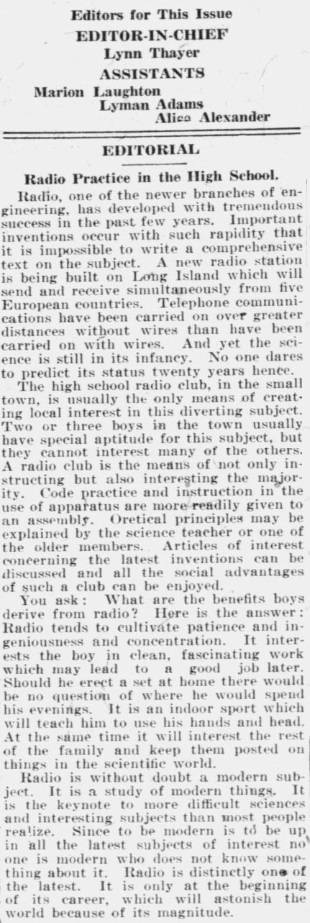 A hundred years ago today, the September 30, 1921, issue of The Brattleboro (Vermont) Daily Reformer carried this editorial. It was under the heading of Brattleboro High School News, and the Editor-In-Chief is identified as Lynn Thayer, a sixteen-year-old student at the school.
A hundred years ago today, the September 30, 1921, issue of The Brattleboro (Vermont) Daily Reformer carried this editorial. It was under the heading of Brattleboro High School News, and the Editor-In-Chief is identified as Lynn Thayer, a sixteen-year-old student at the school.
According to the 1920 call book, the club was already licensed under the call 1UT.
Radio Practice in the High School.
Radio, one of the newer branches of engineering, has developed with tremendous success in the past few years. Important inventions occur with such rapidity that it is impossible to write a comprehensive text on the subject. A new radio station is being built on Long Island which will send and receive simultaneously from five European countries. Telephone communications have been carried on over greater distances without wires than have been carried on with wires. And yet the science is still in its infancy. No one dares to predict its .status twenty years hence.
The high school radio club, in the small town, is usually the only means of creating local interest in this diverting subject. Two or three boys in the town usually have special aptitude for this subject, but they cannot interest many of the others. A radio club is the means of not only instructing but also interesting the majority. Code practice and instruction in the use of apparatus are more readily given to an assembly. Oretical [sic] principles may be explained by the science teacher or one of the older members. Articles of interest concerning the latest inventions can be discussed and all the social advantages of such a club can be enjoyed.
You ask: What are the benefits boys derive from radio? Here is the answer:
Radio tends to cultivate patience and ingeniousness and concentration. It interests the boy in clean, fascinating work which may lead to a good job later. Should he erect a set at home there would be no question of where he would spend his evenings. It is an indoor sport which will teach him to use his hands and head. At the same time it will interest the rest of the family and keep them posted on things in the scientific world.Radio is without doubt a modern subject. It is a study of modern things. It is the keynote to more difficult sciences and interesting subjects than most people realize. Since to be modern is to be up in all the latest subjects of interest no one is modern who does not know something about it. Radio is distinctly one of the latest. It is only at the beginning of its career, which will astonish the world because of its magnitude.
